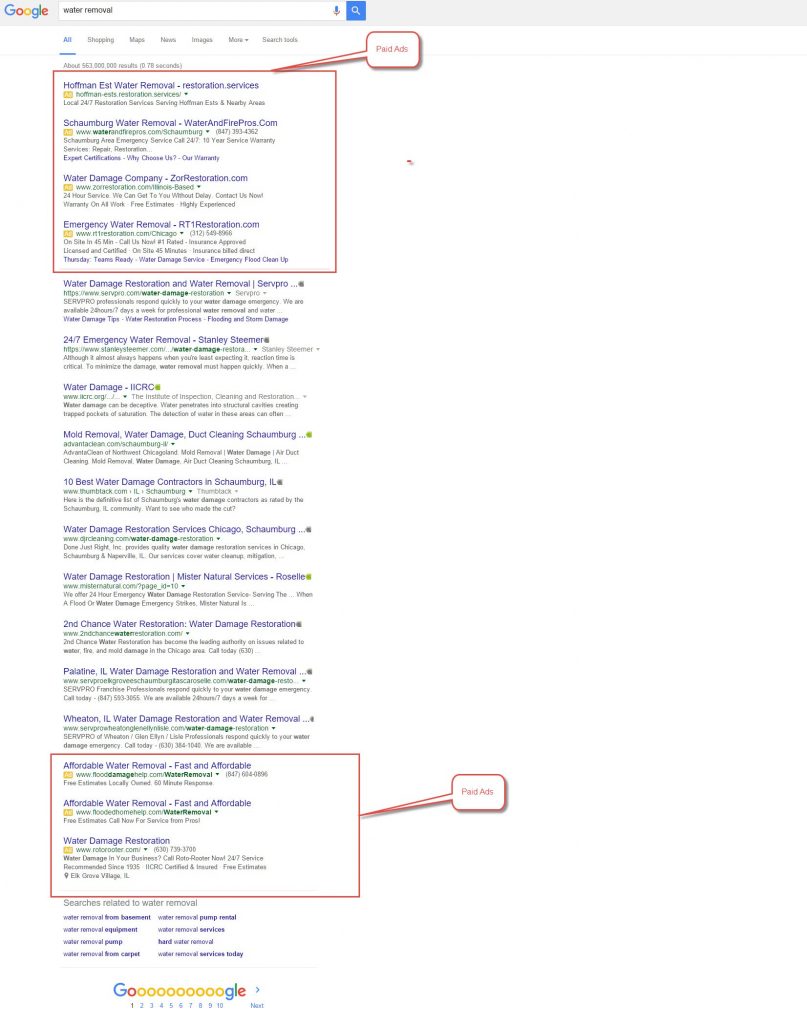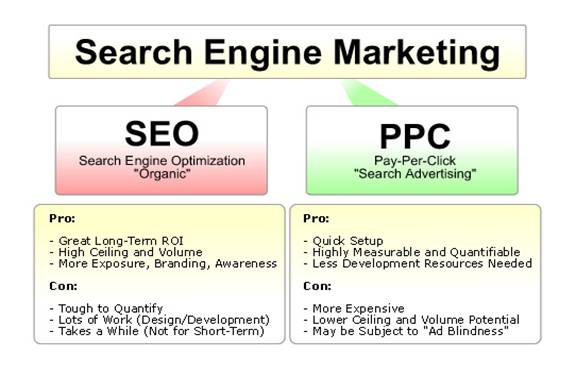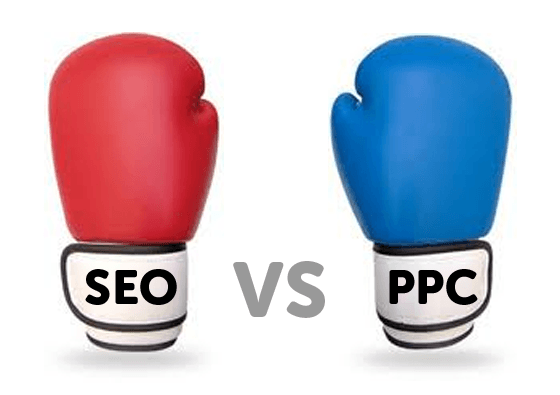The search results you see on Google when you type something in, are either due to SEO or PPC. With Google owning 88% of the UK’s search market, having your company feature on their search listings is essential to be competitive or generate new business. However, for most businesses, it can be a difficult decision whether to pursue SEO, PPC or both so our guide explains what they are, how they work and when they are most effective.

SEO vs PPC at a glance
Search Engine Optimisation (SEO) refers to the techniques used to get your website to rank on Google’s search (or other engines such as Bing or Yahoo). Because you are using techniques, you do not have to pay whenever someone clicks on your website’s listing and being ‘organic’ there is no ‘ad’ symbol next to the result.
Pay Per Click Advertising (PPC) involves paying for adverts on Google. Using Google’s Adwords system, you get to choose the keywords to ‘bid’ on and set a daily budget. You are charged every time someone clicks on your adverts, hence it is called ‘pay per click’ and the higher the position and more competitive keyword you want, the more you will pay.
As shown above, the red boxes are depicted by the paid adverts and anything without an advert is a natural/organic search, and requires search engine optimisation.
What are the advantages of SEO?
It is essentially free to get on Google’s natural search listings. Of course, you need a website and a bit of SEO know-how, but the idea is, that Google naturally rewards the most relevant websites. So, if you have a website with a good design that has been around for a few years and has relevant information about your company and your business, alongside naturally gaining some online PR, you should rank organically. There are some more technical elements such as adding sitemaps, fixing crawl errors, site speed etc but speaking to an SEO professional or doing some reading on Search Engine Watch will help you with the basics.
SEO is more trusted than PPC and 8.5 times more likely to be clicked on (Source: NewMedia). Let’s be honest, no one really likes to click on ads. Some do because they don’t know the difference (Google is good at disguising the ads and making it hard to tell the paid from the organic) or the user is looking for something very specific which isn’t available in the natural listings (think clothes, electrical product). So the idea is that better customers are more likely to click on your SEO listing and get you better quality, which is important for people applying or buying anything.
SEO is long-term because the techniques you deploy such as adding relevant content and gaining online PR through link-building will benefit your website for several years to come. Compared to PPC advertising, as soon as you turn off your ads campaign, the adverts stop and you lose your presence.
Very similarly, when you refresh the page, new paid ads will come up because it works on a bidding structure, but with SEO, if you are on page 1, will likely stay there (at least for the day) and have better presence. To give an example, if users are researching a product and are coming back on their second, third or forth time, ranking organically will mean you are always there in the listings, whereas paid adverts will come and go and you may miss out.
The disadvantages of SEO
The downside of SEO is that it takes a long time; with a new site needing around 3-12 months to rank competitively for a target keyword. After all, you aren’t going to jump to page 1 immediately, you will start on page 10 and work your way up and this takes time for Google to assess your trustworthiness.
Another issue is that results can be volatile as Google changes its algorithm regularly to clean up the search rankings. The techniques used by you or your SEO practitioner can be very effective one year but be frowned upon the next, causing your rankings to fall 10 pages and take several weeks or months to recover.
There is also the reputation of the industry. Whilst there are several good SEO practitioners in the UK and around the world, there is a dark side to the market where companies have used spammy tactics to manipulate search results on Google. Hijacking websites and spamming competitors has been common over the years, although Google is cracking down on it. There is also the gap of knowledge between practitioners and clients, meaning some companies, mostly in Asia, have up sold SEO with poor techniques and this has caused bad results for UK businesses.

What are the advantages of PPC?
The biggest advantage of PPC is that you can set up quickly and your adverts go live on the same day. So for a brand new start up or website looking to gain some immediate traffic, PPC is a practical way of doing so. Also, if you have been hit by a Google penalty and fallen down on SEO, you can use PPC as a way to keep the flow of traffic coming in. Set up is straightforward using Adwords and can be done without any know-how or experience. However, to maximise and optimise your keywords and adverts, having some expertise is beneficial.
Using PPC is very measurable which is great for anyone needing to report to senior staff or the people above breathing down your neck. You can choose your daily budget, which keywords you target, the ads you show and your positions – so you can see exactly where you money has gone. PPC can also be more granular to include locations, devices, times of day and more, to target your ideal customers.
PPC allows you to do remarketing so that when users come to your website and have not converted, you can continue to show them adverts on Google’s Display Network. Using cookies, they are able to retarget you which is why you go to a website like John Lewis or Topshop and find their adverts following you around on DailyMail or The Guardian. Remarketing can be very low cost as you are only charged when someone clicks on your advert and it can be very effective.
The disadvantages of PPC
PPC is expensive and each click is certainly more expensive than SEO. Essentially, you are paying extra for the luxury of advertising immediately and for still having some presence despite not ranking organically. Depending on the industry, competition can be tough and top spots are expensive with loans costing up to £20 per click, gambling up to £50 per click and insurance up to £100 per click. If you are in a competitive industry, you really need to large budget if you are going to make an impact.
As the adverts rely on a bidding system, the adverts change every time you refresh the page and so you can lose presence. It means that if people click on your advert, don’t convert and then go back to Google several weeks later, they may not find you again unless you are still advertising at that precise point.
There is the issue of ad blindness that some people will ignore your adverts or attract lower quality, such as the most impulsive or those that are window shopping without looking to convert, but you will still incur a charge.
The best strategy for Startups
One of the most practical solutions when deciding between PPC and SEO is actually using both. For new startups, PPC can be used in the immediate term, to generate some traffic, see how well people are using the site and also find out the best keywords. In the background, they can work on SEO which can take a few months and when it kicks in, you can replace the paid adverts for natural and free organic listings.
How SEO and PPC can help each other
You can decide to run both at the same time; you may find that business is good and you have the right margins in place so you want to generate as much traffic as possible, so PPC and SEO together can be valuable. Also, optimising a site for Google using SEO will require filling your site with useful content and this will probably make your PPC ads more relevant and more cost effective.
An ongoing debate is whether paying for PPC ads helps with your SEO rankings. Ultimately, Google like it when you use their tools like Analytics, YouTube and Adwords. Also, people going to your site, spending time on it and clicking around shows a good user experience and this is good for SEO. If they don’t like the site and leave immediately, this could have a negative impact so it is important to understand how they can compliment each other to be successful.



